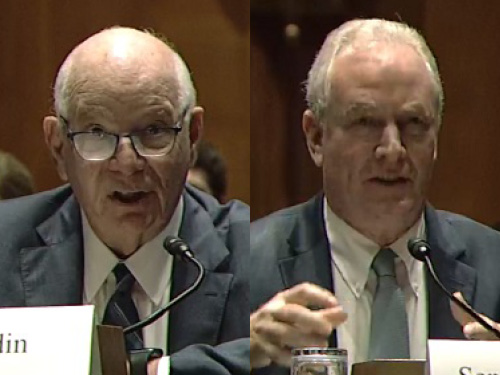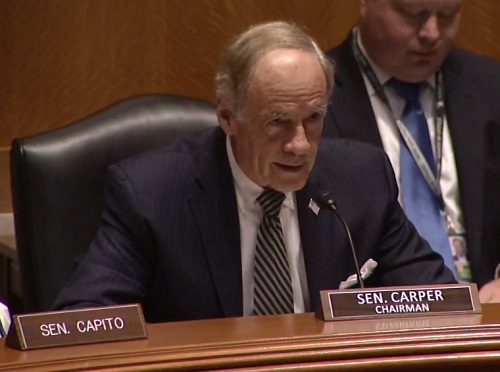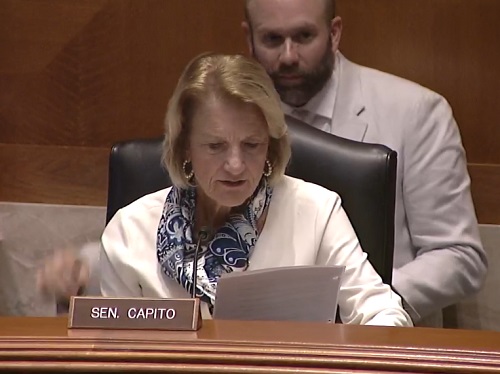A Senate Committee on Environment and Public Works hearing on July 10 examined the response to the Francis Scott Key Bridge collapse on March 26 and subsequent recovery efforts, culminating in the reopening of critical Port of Baltimore waterways on June 12 following the successful removal of bridge debris.
[Above photo via the Senate EPW committee]
That hearing featured two panels of five witnesses. The first panel featured Sen. Ben Cardin (D-MD) and Sen. Chris Van Hollen (D-MD) and their perspectives on the bridge collapse and subsequent recovery efforts.

They also discussed the proposed Baltimore Bridge Response Invests and Delivers Global Economic Relief Act or “Baltimore BRIDGE Relief Act” that seeks to ensure 100 percent federal funding for the structure’s replacement – “making good on the president’s promise in the early days of this tragedy,” noted Sen. Van Hollen – by “mirroring” the actions of the federal government in other similar disasters around the country.
The second panel featured Shailen Bhatt, administrator of the Federal Highway Administration; Lieutenant General Scott Spellmon, commanding general of the U.S. Army Corps of Engineers; and Paul Wiedefeld, secretary of the Maryland Department of Transportation.

“Many of our colleagues have heard me frequently quote Albert Einstein who used to say that in adversity lies opportunity. I hope that [this] hearing will serve as an opportunity for us to discuss the lessons learned from this tragedy and the immediate response,” Sen. Tom Carper (D-DE), outgoing chair of the EPW committee, in his opening statement.
“We’ll also discuss the path that lies ahead to help rebuild the bridge and consider how we can prevent tragedies like this from happening in the future in America,” he said.
Sen. Shelley Moore Capito (R-WV), ranking member on the EPW committee, stressed in her opening statement “how impressed” she was by the “rapid and professional response” to the Key Bridge collapse from federal, state, and local agencies.

“I also want to extend my condolences to the families of the six folks who unfortunately lost their lives that day,” she noted. “We are grateful that the quick action to close the bridge to traffic prevented further loss of life, and that the response and recovery efforts began almost immediately thereafter.”
Maryland DOT’s Wiedefeld noted the immediate provision of $60 million in quick release Emergency Relief funds from the FHWA proved “invaluable” in performing the crucial first steps of clearing the auxiliary channel of bridge debris in order to get maritime activity restarted into and out of Baltimore’s port.
“Difficult times call for resolve and unified responses, and I am buoyed by the way all levels of government have rallied to address this crisis,” he said in his testimony.

“The effects of the bridge will be felt nationwide until the bridge is repaired,” Wiedefeld added. “This bridge is a key component of the I-95 corridor and is essential to the free flow of needed commerce and vehicle transit. It serves as a vital connection for people and goods travelling throughout the entire east coast and nation.”
That’s one reason why he supports the Baltimore BRIDGE Relief Act being proposed to Congress. “Specifying that the federal government will pay the upfront costs of the bridge does not mean taxpayers will bear the entire expense of the repair,” Wiedefeld stressed. “Funds recovered from insurance proceeds and culpable parties will be applied to reduce the cost ultimately borne by the federal government; sums that are expected to be substantial.”
He added that preliminary estimates indicate the replacement of the Francis Scott Key Bridge will cost approximately $1.7 billion.



